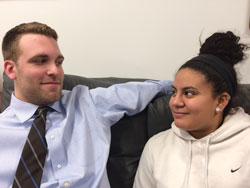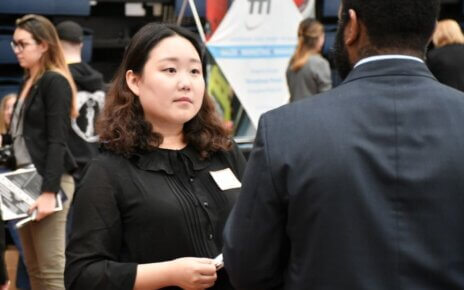In order to continue the fight against bias and effort to promote respect among all people, the University hosted the 7th annual “Break the Cycle: Be the Change” last Thursday.
As students made their entrance into Anacon
Hall in the Rebecca Stafford Student Center, they were greeted by representatives from First Year Seminar, Counseling and Psychological Services, and the American Conference on Diversity.
The students were then split into groups to prepare for group discussions and skits to be held after the introduction.
The introduction covered basic ideas concerning discrimination and bias, including the idea that prejudice is a learned behavior, therefore it can be unlearned.
Kalisse Richardson, a member of the American Conference on Diversity, explained how hearing something new for the first time in a conversation can be difficult at first, but working towards understanding is worthwhile.
“Being actively engaged in the community can help bring about change,” Richardson said.
Following this was the group work. Ground rules were established that can be applied in daily life, such as keeping an open mind, taking responsibility for your actions and words, and communicating honestly.
Scenarios were then laid out which pondered what a change maker or change stopper would do in this situation. A change stopper is defined as a person who looks at a problem and puts all blame on other individuals, while a change maker is a person who looks at a problem and connects it to root causes to seek understanding and promote respect.
During group discussions, participants were welcome to share their own personal experiences with certain issues and confidentiality was kept within each group. The discussions were directed by trained leaders, including Deborah Molinaro and Nicole DeFonzo.
Molinaro, Administrative Assistant at the Student Center, believes that diversity is one of the University’s values that is interwoven into the fabric of the University. According to Molinaro, there are a number of techniques to facilitate serious conversations, the most important of which are the following: create a safe, non-judgmental space for the conversation, share your experiences and go into the conversation realizing that you can never change another person.
“The key is respect for others which is something that can be taught and learned,” Molinaro said. “I’ve seen improvement on our own campus since I’ve been here. I have great hope for future generations, especially as we move forward as a global community.”
DeFonzo, a sophomore and Peer Learning Assistant, said that she enjoyed her experience as a conversation facilitator for this event.
“I think the small groups were effective for discussing serious issues because, in these groups, the students were able to make up their own skits and role play, so they could actually feel what it was like to be a person being discriminated against,” DeFonzo said. “The small groups allowed the students to be more comfortable in sharing their thoughts and feelings about the issues.”
“I hope the freshmen who attended understand that discrimination is a problem and that they set out to change the cycle of prejudice and discrimination so that everyone is treated equally,” DeFonzo added.
Students who attended the event, or are interested in diversity awareness, are encouraged to attend the Annual Diversity Awareness Training Program scheduled for February 29.



